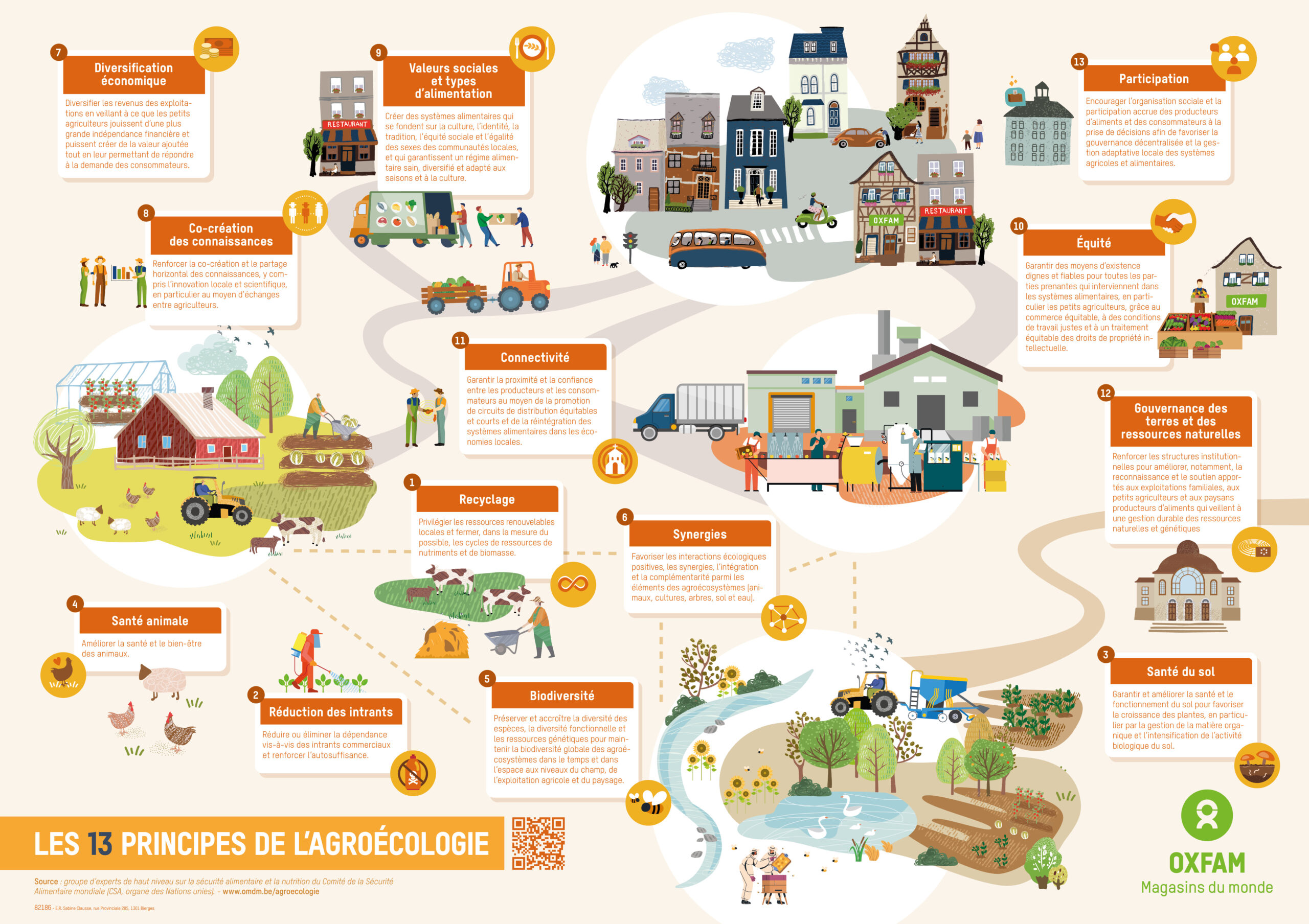
WHAT IS AGROECOLOGY?
The campaign dedicated to agroecology, carried out by Oxfam-Magasins du Monde in 2024, invites the audience to think about a fair and sustainable way of cultivating.
“How about retaking control of our feeding?” is the slogan of the campaign.
USEFUL FOR
- Managers and volunteer trainers, organisations working with volunteers
- Volunteers and operators in the organisations
TYPE OF TOOL
Campaign
Information
MAIN FIELDS OF ACTION
Ethical Purchases
Fair Trade
SDG Awareness
Sustainability
DESCRIPTION
1) “Quest-ce que l’agroécologie?”/ “What is agroecology?”
Video in French | Video in English
(Created by iPES FOOD - international panel of experts on sustainable food systems)
“Agroecology is a way of farming with nature, not against it. It builds resilience to climate change and epidemics, by combining different plants and animals based on farmers' own knowledge of their local environment. Agroecology does not rely on chemicals to fertilise crops and control pests - it relies on diversity. And this diversity in the fields translates into a diversity of fresh, nutritious food for communities. So, are we going to remain trapped in the 20th century? Or will we embrace agroecology as the next evolution of food systems.”
2) Poster “Principles of Agroecology”
One of the strengths of agroecology is its systemic and knowledge-intensive nature ("inputs are replaced by knowledge"). By strongly challenging the agronomic model, it aims to transform the entire food system, including in terms of equity and accessibility (source: Gliessman S. 2014. Agroecology : the ecology of sustainable food systems, Third edn. CRC Press, Boca Raton, p. 405). In this respect, agroecology is both a critique and a solution (source: Buttel, F.H. 2003. Envisioning the future development of farming in USA: Agroecology between extinction and multifunctionality?)
Olivier De Schutter already highlighted this aspect in his landmark report to the UN in 2011: "a solution to rural poverty, malnutrition, climate change and biodiversity loss.” (source: De Schutter O. 08/03/2011. “Agroécologie et droit à l’alimentation”. Rapport présenté à la 16ème session du Conseil des droits de l’homme de l’ONU).
This multifunctionality, as well as its holistic and flexible character according to local context, make it difficult to summarise agroecology in a series of criteria, like an organic farming specification. Oxfam-Magasins du monde and and its allies refer to Nyelini's 11 pillars of agroecology, as well as the and the 13 principles of the HLPE (High Level Panel of Experts on Food Security and Nutrition). These different principles provide a framework for the various approaches and recognize truly transformative agroecology from other initiatives.
Extra activities
As a kick-off activity or concluding one, it is also easy to create a quiz about responsible consumption/production in your country. Check the example of the quiz created by the JM (OXMDM Youth) team for animations in schools in Belgium in the file “Fiche QuizZ: Test your kowledge about agroecology (info about France and Belgium)”.
You can include a short “check list” of concrete steps to contribute positively. Examples - contribute to agroecology with Oxfam-Magasins du Monde:
- Inform yourself and pass the word: watch promotional videos about agroecology and share them
- Organise a cinema-debate
- Invite the theatre play “Feed humanity act 2”
- Join the committed festivals in your region
- Go for responsible and Fair Trade products
- Join the events “Oxfam breakfasts” in November
- Subscribe to the Citizen Magazine “Tchak!”
- Join the Climate March in Decembre
Context: With agribusiness playing an increasingly important role (alongside with the intensive use of pesticides, synthetic fertilisers and fossil fuels), we have lost our food sovereignty. This situation has also caused a series of damage to our health, our soils, our climate, our biodiversity and our landscapes.
The materials explained here (video + poster) will help anyone to raise awareness about the challenges the planet is facing as a result of new agricultural technologies, understand the functioning of agriculture and will help promoting a more responsible way of production.
DOWNLOAD MATERIALS
LINKS TO ONLINE RESOURCES
e-book of the campaign (available in French only)
Agroecology and the Sustainable Development Goals

